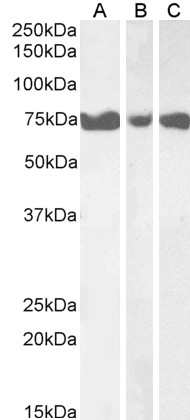IP3KC Antibody (internal region)
Peptide-affinity purified goat antibody
- SPECIFICATION
- CITATIONS
- PROTOCOLS
- BACKGROUND

Application
| WB, E |
|---|---|
| Primary Accession | Q96DU7 |
| Other Accession | NP_079470.1, 80271 |
| Reactivity | Human |
| Host | Goat |
| Clonality | Polyclonal |
| Concentration | 0.5 mg/ml |
| Isotype | IgG |
| Calculated MW | 75207 Da |
| Gene ID | 80271 |
|---|---|
| Other Names | Inositol-trisphosphate 3-kinase C, 2.7.1.127, Inositol 1, 4, 5-trisphosphate 3-kinase C, IP3 3-kinase C, IP3K C, InsP 3-kinase C, ITPKC, IP3KC |
| Dilution | WB~~1:1000 E~~N/A |
| Format | 0.5 mg/ml in Tris saline, 0.02% sodium azide, pH7.3 with 0.5% bovine serum albumin |
| Storage | Maintain refrigerated at 2-8°C for up to 6 months. For long term storage store at -20°C in small aliquots to prevent freeze-thaw cycles. |
| Precautions | IP3KC Antibody (internal region) is for research use only and not for use in diagnostic or therapeutic procedures. |
| Name | ITPKC (HGNC:14897) |
|---|---|
| Synonyms | IP3KC |
| Function | Catalyzes the phosphorylation of 1D-myo-inositol 1,4,5- trisphosphate (InsP3) into 1D-myo-inositol 1,3,4,5-tetrakisphosphate and participates to the regulation of calcium homeostasis (PubMed:11085927, PubMed:12747803). Can phosphorylate inositol 2,4,5- triphosphate to inositol 2,4,5,6-tetraphosphate (By similarity). |
| Cellular Location | Nucleus. Cytoplasm. Note=Shuttles actively between nucleus and cytoplasm with both nuclear import and nuclear export activity {ECO:0000250|UniProtKB:Q80ZG2} |
| Tissue Location | Highly expressed in pancreas, skeletal muscle, liver, placenta and weakly in kidney and brain |

Thousands of laboratories across the world have published research that depended on the performance of antibodies from Abcepta to advance their research. Check out links to articles that cite our products in major peer-reviewed journals, organized by research category.
info@abcepta.com, and receive a free "I Love Antibodies" mug.
Provided below are standard protocols that you may find useful for product applications.
References
ITPKC functional polymorphism associated with Kawasaki disease susceptibility and formation of coronary artery aneurysms. Onouchi Y, Gunji T, Burns JC, Shimizu C, Newburger JW, Yashiro M, Nakamura Y, Yanagawa H, Wakui K, Fukushima Y, Kishi F, Hamamoto K, Terai M, Sato Y, Ouchi K, Saji T, Nariai A, Kaburagi Y, Yoshikawa T, Suzuki K, Tanaka T, Nagai T, Cho H, Fujino A, Sekine Nat Genet. 2008 Jan;40(1):35-42. Epub 2007 Dec 16. PMID: 18084290
If you have used an Abcepta product and would like to share how it has performed, please click on the "Submit Review" button and provide the requested information. Our staff will examine and post your review and contact you if needed.
If you have any additional inquiries please email technical services at tech@abcepta.com.













 Foundational characteristics of cancer include proliferation, angiogenesis, migration, evasion of apoptosis, and cellular immortality. Find key markers for these cellular processes and antibodies to detect them.
Foundational characteristics of cancer include proliferation, angiogenesis, migration, evasion of apoptosis, and cellular immortality. Find key markers for these cellular processes and antibodies to detect them. The SUMOplot™ Analysis Program predicts and scores sumoylation sites in your protein. SUMOylation is a post-translational modification involved in various cellular processes, such as nuclear-cytosolic transport, transcriptional regulation, apoptosis, protein stability, response to stress, and progression through the cell cycle.
The SUMOplot™ Analysis Program predicts and scores sumoylation sites in your protein. SUMOylation is a post-translational modification involved in various cellular processes, such as nuclear-cytosolic transport, transcriptional regulation, apoptosis, protein stability, response to stress, and progression through the cell cycle. The Autophagy Receptor Motif Plotter predicts and scores autophagy receptor binding sites in your protein. Identifying proteins connected to this pathway is critical to understanding the role of autophagy in physiological as well as pathological processes such as development, differentiation, neurodegenerative diseases, stress, infection, and cancer.
The Autophagy Receptor Motif Plotter predicts and scores autophagy receptor binding sites in your protein. Identifying proteins connected to this pathway is critical to understanding the role of autophagy in physiological as well as pathological processes such as development, differentiation, neurodegenerative diseases, stress, infection, and cancer.


